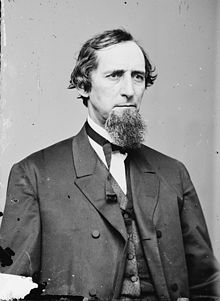Edgar Cowan | |
|---|---|
 | |
| United States Senator from Pennsylvania | |
| In office March 4, 1861 – March 3, 1867 | |
| Preceded by | William Bigler |
| Succeeded by | Simon Cameron |
| Personal details | |
| Born | September 19, 1815 Sewickley Township, Pennsylvania, U.S. |
| Died | August 31, 1885 (aged 69) Greensburg, Pennsylvania, U.S. |
| Resting place | St. Clair Cemetery, Greensburg, Pennsylvania |
| Political party | Whig (before 1855) Republican (from 1855) Democratic (from 1867) |
| Spouse | Lucitra Oliver Cowan |
| Children | 3 |
| Education | Franklin College |
| Profession | Attorney |
| Signature | |
Edgar Cowan (September 19, 1815 – August 31, 1885) was an American lawyer and Republican politician from Greensburg, Pennsylvania. He represented Pennsylvania in the United States Senate during the American Civil War.
A native of Sewickley Township, Pennsylvania, Cowan worked as a carpenter, boatman, and teacher before graduating from Franklin College in New Athens, Ohio, in 1839. He studied law with Henry Donnel Foster, was admitted to the bar, and practiced in Greensburg, Pennsylvania. Cowan also became active in politics as a Whig, and campaigned for the party's presidential candidates beginning with William Henry Harrison in 1840. With the demise of the Whigs, Cowan became a Republican in 1855, and supported John C. Frémont for president in the 1856 election.
In 1860, Cowan was a delegate pledged to Simon Cameron at the Republican National Convention, and backed Cameron until Cameron gave his support to Abraham Lincoln. In early 1861, Cowan was the Cameron-backed candidate for a U.S. Senate seat, and won the election held by the Pennsylvania legislature. He served one term, 1861 to 1867, and was chairman of the Committee on Patents and the Patent Office for most of his Senate career. Cowan became a supporter of Andrew Johnson's plan for post-Civil War Reconstruction, which cost him the support of Cameron's Republican organization in Pennsylvania. Cowan was defeated for reelection to the Senate, and Radical Republicans who opposed Johnson then blocked Cowan's appointment as U.S. Minister to Austria.
After leaving the Senate, Cowan was a supporter of Democratic candidates including Horace Greeley, the Democratic and Liberal Republican nominee for president in 1872 and Democrats Samuel J. Tilden in 1876 and Winfield Scott Hancock in 1880.
Cowan became ill with mouth and throat cancer in 1884. He died in Greensburg on August 31, 1885, and was buried at St. Clair Cemetery in Greensburg.